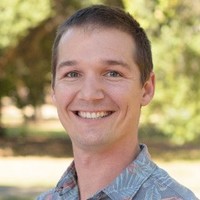
Timothy L. Shelton
- Courses6
- Reviews19
- School: Shasta College
- Campus:
- Department: Chemistry
- Email address: Join to see
- Phone: Join to see
-
Location:
11555 Old Oregon Trail
Redding, CA - 96003 - Dates at Shasta College: November 2016 - January 2020
- Office Hours: Join to see
N/A
Would take again: Yes
For Credit: Yes
0
0
Mandatory
Awesome
Prof. Shelton is a wonderful prof who really cares about his students. Attendance really matters in his class because you will really have to answer questions online for participation. He also gives a textbook that isn't necessary to use because lectures are based on it. For each test, he gives a practice exam as well. Overall, he made the class enjoyable for everyone.
Biography
Shasta College - Chemistry
Experience
UC Davis
Graduate Student
Researcher in solar energy conversion, nanomaterials, photoelectrochemistry, water splitting.
Shasta College
Chemistry Instructor
Teaching introductory chemistry to a diverse student population using evidence based practices, primarily using active learning techniques for student engagement.
UC Davis - Center for Excellence in Teaching and Learning
Teaching Assistant Consultant
- Provided consultations to teaching assistants to improve their teaching effectiveness based on video analysis, student surveys and interviews, and reviewing teaching-related documents.
- Worked as part of a team of 10 TACs to design and execute workshop series in Fall '14 ( Demonstrating “Teaching Excellence” - The Teaching Portfolio) and Winter '15 (Student, Classroom, Instructor: Strategies for aligning teaching with learning)
- Helped design and execute TA Orientation workshops for all incoming UC Davis teaching assistants with emphasis on classroom diversity, active learning strategies, and using technology in the classroom.
Education
California State University, Chico
Bachelor of Science - BS
Chemistry
University of California, Davis
Doctor of Philosophy (Ph.D.)
Inorganic Chemistry
Received Outstanding Teaching Assistant Award in General Chemistry (2014, 2016). Undergraduate Research Mentor for six students in research methods, data analysis, problem solving, and career path exploration. Member of UC Davis Chemical Education Research community.UC Davis
Graduate Student
Researcher in solar energy conversion, nanomaterials, photoelectrochemistry, water splitting.Butte College
Associate’s Degree
Social and Behavioral Sciences
Publications
Photocatalytic water oxidation with iron oxide hydroxide (rust) nanoparticles
Journal of Photonics for Energy
Photocatalytic water oxidation with iron oxide hydroxide (rust) nanoparticles
Journal of Photonics for Energy
Photochemistry of hematite photoanodes under zero applied bias
Applied Catalysis A: General
Observing photochemical charge separation and oxidation reactions on iron oxide nanowire arrays using surface photovoltage spectroscopy (SPS).
Possible Matching Profiles
The following profiles may or may not be the same professor:
- Timothy Shelton (40% Match)
Instructor-Physical Science
Shasta College - Shasta College




